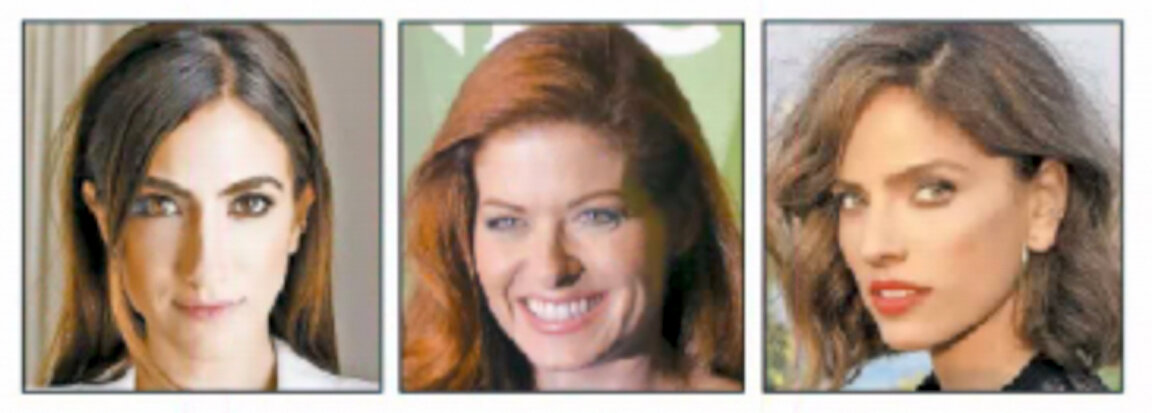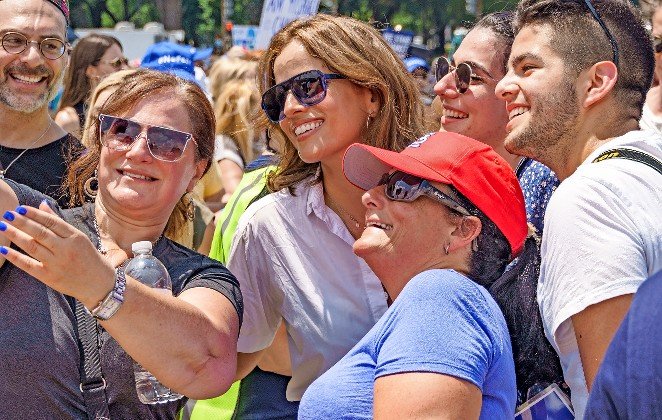3 of our eshet chayil
I recently watched a YouTube video filmed last year in which a Jewish woman tried to have a respectful conversation with a virulently anti-Israel student at UC Berkeley.
I was in awe of her courage, grace and cogent arguments. She didn’t need to be there, on a campus where a riot recently broke out against Jewish students in response to an Israeli speaker, and in a city whose school district is now being accused of knowingly tolerating “antisemitic bullying,” according to a federal complaint.
At one point in the video, a male student screamed in the woman’s face and called her a “dumb mother[expletive].” Another male student referred to the woman and the pro-Israel students surrounding her as “you people,” prompting her to respond, “It’s not ‘you people.’ Don’t discriminate. I’m a person. My name is Noa.”
I’m referring to Noa Tishby, the best-selling author of “Israel: A Simple Guide to the Most Misunderstood Country on Earth” and Israel’s former special envoy for combating antisemitism and delegitimization.
A prolific actress, producer and activist, Tishby, a Tel Aviv native now living in Los Angeles, has completed her second book, “Uncomfortable Conversations with a Jew,” co-written with best-selling author Emmanuel Acho and available in late April.
Witnessing Tishby’s bravery also made me think about actress and activist Debra Messing. Like Tishby, she confronts vicious antisemites with resilience and grace.
Messing, who was born and raised in Rhode Island, spoke at the Nov. 14 rally for Israel in Washington, and recently visited Israel. She sat with soldiers and victims of Oct. 7, simply offering to listen to their stories. I adore Messing for this, and for the fact that she is constantly posting Instagram videos reminding all of us, especially young Jews, not to be afraid.
And then there’s my childhood friend Mandana Dayani, a visionary entrepreneur and creator and co-founder of the “I am a voter” organization, which promotes democracy by encouraging people to vote.
Dayani, who escaped post-revolutionary Iran as a little girl with her family, also recently traveled to Israel, visiting the remains of devastated kibbutzim in the south and speaking with victims of Oct. 7. Dayani is fearless when it comes to exposing antisemitism and defending (and celebrating) Jews and Judaism, especially on social media. She shares this wonderful fearlessness with Tishby and Messing.
I decided to ask each of these extraordinary women two simple questions.
Of course, the female victims of Oct. 7, the female IDF soldiers and medics, the mothers and wives of slain soldiers and so many more Israeli women are heroes who should be honored each day.
But day in and day out, women like Dayani, Messing and Tishby are battling antisemites and putting much on the line in defense of Israel and the Jewish people. Their responses to my questions reminded me of “Eshet Chayil,” King Solomon’s tribute to the Jewish woman in the Book of Proverbs, which begins by asking, “A woman of valor who can find? Her value far exceeds that of gems.”
Q: For years, you have been targeted online by relentless antisemites. From where do you derive such courage and clarity to confront one antisemite or ill-informed person after another?
Mandana Dayani: Everything I have ever done has been rooted in my commitment to upholding humanity and advocating for more rights for more people. And as we see misinformation being weaponized to divide us and propaganda being deployed with the clear agenda to delegitimize Israel and dehumanize Jews, I refuse to be a participant in the dissemination of more hate and divisive language in this world.
Progress is not taking rights from one group of people to give them to another. The violence and targeting of Jews today is not activism. It is a witch-hunt fueled by bots, propaganda and an alarming mental health crisis around the world.
I will continue to ask for more people to do the right thing, to stand up against hate, to share fact-based information, and to lead with compassion. I believe the majority of the world disagrees with the radical ideologies of the mobs inciting violence. We cannot pander to extremists because they are louder or scarier.
Debra Messing: “What has given me strength when the hate and accusations start to penetrate is moral clarity. I always return to “What is my purpose?” I believe [that] because I was given a platform, that it is my responsibility to use it intentionally.
I know that antisemitism and anti-Zionism are racism. I know all racism is wrong. I know Israel is the ancestral homeland of the Jews, and I know Israel has a right to exist. I know that I have facts behind me and that it is possible to hold my beliefs about Jews and Israel and also hold compassion for, and acknowledge the suffering and painful history of, the Palestinians.
Noa Tishby: The Berkeley event was intense and hostile. So, I am glad it didn’t end up with anybody physically attacking me. I get my strength first and foremost from my mom.
When people ask me how I’m such a strong woman, I literally brush them off and send them to my mother, because she is the fiercest woman I have ever met. She’s never met a fight that she didn’t want to take on and it’s always for what she thought was right. I think I get my strength from her, along with my sisters, my dad and my entire family.
I also have a very strong compass of what’s right and what’s wrong, and that’s why I’m unmovable on those issues. I don’t get fazed out by bad comments or when people attack me. I just know that we need to be strong and united and fight for what we know is right.
There is an unprecedented level of Jew-hate that is rising right now and the only way that we can fight against it is to be firmly planted in who we are and stand up against it and not be afraid. So, I honestly attribute all of that to my mother, Yael Artzi. She is just incredible.”
Q: How has your identity as a Jewish woman inspired and informed your tireless advocacy on behalf of Israel and the Jewish people?
Dayani: My identity as a mother and activist is deeply rooted in the influences of the strong, brave matriarchs of my family. Our family was held together by their unwavering courage, fortitude and commitment to upholding the traditions that defined us.
So many of the values of our culture — welcoming the stranger, tikkun olam, compassion, curiosity, hope, resilience and a commitment to upholding family and community — all define my activism.
My advocacy has always tried to perpetuate these values and to bring in others to do the same — to advocate for humanity as a collective. I sort of see advocacy like a Shabbat dinner table — we always leave the door open and seats available at the table so others can feel welcome and join in.
Oct. 7 completely shook me to my core. The unspeakable violence we witnessed that day and the unimaginable hatred and propaganda that has since taken hold of so many around the world, woke up many of us in the Diaspora.
As someone who fled the terrorist leadership of my homeland [Iran] for the opportunity to live safely as a Jew, I believe that my safety and security are inextricably linked to Israel. And I am never going to stop advocating for a world free of that same terrorism that seeks to destroy all the values I mentioned above and democracies around the world.
Messing: I was raised by two very proud Zionist parents. They taught me that it is our responsibility as Jews in the Diaspora to protect Israel. I was taught that Israel is precious.
I am a proud Jew and it is impossible for me to see the massacre of our people by a terrorist group and not scream out that it is wrong. I know our history of persecution and feel a new potent unity amongst our very diverse Jewish community. I will always stand with the Jewish people and the Jewish homeland. We are all intertwined.
Tishby: I talk about my identity a lot in my first book. My identity was shaped more as a secular Zionist than as being Jewish. I grew up in a very secular family, I always tell people I had never been to a synagogue before I moved to Los Angeles. It’s a beautiful thing because it allowed me to reach my Jewish identity from an independent place and find it for myself.
I think that living in America as a Jewish person, as an Israeli, after taking being Jewish for granted for so many years, allowed me to connect to it at an entirely different level.
I did an event a couple of years ago and this rabbi came up to me and said, “I read your book, and do you know why God invented America? So, Israelis can remember that they’re Jewish.”
I started laughing, but it resonated with me because my Jewish identity was essentially shaped after moving to the Diaspora and finding for myself how brilliant and inspiring and beautiful and smart and deep, ancient, diverse and poetic our culture and traditions are. It is such a blessing.

 43.0°,
Partly Cloudy
43.0°,
Partly Cloudy 







